Director of the Institute of Church History: On the arrival of the Germans Sheptytsky pinned his hopes on the future of Ukraine, not on Nazi Germany
Thursday, 25 November 2010, 19:21 During the German occupation, the Ukrainian government had to adhere to God's laws and recognize the equality of everyone before the civil law. According to Metropolitan Sheptytsky, these were two elements of just orders and wise leadership, which the Christians had to obey. The hidden meaning of this doctrine lies in the fact that in the case of failing to meet these conditions, Ukrainians were not obliged to subordinate to the civil authorities.
These words were stated on November 23, 2010, by Fr. Andriy Mykhaleyko, director of the Institute of Church History of the Ukrainian Catholic University...
During the German occupation, the Ukrainian government had to adhere to God's laws and recognize the equality of everyone before the civil law. According to Metropolitan Sheptytsky, these were two elements of just orders and wise leadership, which the Christians had to obey. The hidden meaning of this doctrine lies in the fact that in the case of failing to meet these conditions, Ukrainians were not obliged to subordinate to the civil authorities.
These words were stated on November 23, 2010, by Fr. Andriy Mykhaleyko, director of the Institute of Church History of the Ukrainian Catholic University...
 During the German occupation, the Ukrainian government had to adhere to God's laws and recognize the equality of everyone before the civil law. According to Metropolitan Sheptytsky, these were two elements of just orders and wise leadership, which the Christians had to obey. The hidden meaning of this doctrine lies in the fact that in the case of failing to meet these conditions, Ukrainians were not obliged to subordinate to the civil authorities.
These words were stated on November 23, 2010, by Fr. Andriy Mykhaleyko, director of the Institute of Church History of the Ukrainian Catholic University, during the webinar "Metropolitan Andrey Sheptytsky During the German Occupation: Between Tolerance and Resistance."
"In the second pastoral letter to the clergy and laity of the Church on July 5, 1941, Metropolitan Sheptytsky concentrated his attention on the future united Ukraine and the unification of its western and eastern regions. Undoubtedly, this broader notion of Ukraine is closely linked with the movement of German troops to the east. However, in the text Sheptytsky pinned his hopes solely on the future of Ukraine, rather than the future of Nazi Germany or the ideology of National Socialism."
According to Fr. Andriy, "the political views of Sheptytsky during the early period of German occupation were based on a positive assessment of the end of Soviet domination. Being convinced in the need to resist the communist government, which was persecuting religious freedom, the metropolitan did not see immediate need to oppose to the German regime. It seemed that the new situation demanded a peaceful coexistence with the new occupation government."
"After a few months the opinions of Sheptytsky began to change,” noted the director of the Institute of Church History. “At first he was careful as not to harm the forms of religious freedom, which were not ideal but still better than under Soviet occupation. The metropolitan soon was convinced that the German state is almost diabolical and even worse than the Soviet regime. In his letter to Pope Pius XII from August 29-31, 1942, he for the first time openly and directly condemns the occupation."
During the German occupation, the Ukrainian government had to adhere to God's laws and recognize the equality of everyone before the civil law. According to Metropolitan Sheptytsky, these were two elements of just orders and wise leadership, which the Christians had to obey. The hidden meaning of this doctrine lies in the fact that in the case of failing to meet these conditions, Ukrainians were not obliged to subordinate to the civil authorities.
These words were stated on November 23, 2010, by Fr. Andriy Mykhaleyko, director of the Institute of Church History of the Ukrainian Catholic University, during the webinar "Metropolitan Andrey Sheptytsky During the German Occupation: Between Tolerance and Resistance."
"In the second pastoral letter to the clergy and laity of the Church on July 5, 1941, Metropolitan Sheptytsky concentrated his attention on the future united Ukraine and the unification of its western and eastern regions. Undoubtedly, this broader notion of Ukraine is closely linked with the movement of German troops to the east. However, in the text Sheptytsky pinned his hopes solely on the future of Ukraine, rather than the future of Nazi Germany or the ideology of National Socialism."
According to Fr. Andriy, "the political views of Sheptytsky during the early period of German occupation were based on a positive assessment of the end of Soviet domination. Being convinced in the need to resist the communist government, which was persecuting religious freedom, the metropolitan did not see immediate need to oppose to the German regime. It seemed that the new situation demanded a peaceful coexistence with the new occupation government."
"After a few months the opinions of Sheptytsky began to change,” noted the director of the Institute of Church History. “At first he was careful as not to harm the forms of religious freedom, which were not ideal but still better than under Soviet occupation. The metropolitan soon was convinced that the German state is almost diabolical and even worse than the Soviet regime. In his letter to Pope Pius XII from August 29-31, 1942, he for the first time openly and directly condemns the occupation."
Department of Information UCU
LATEST NEWS

We can imagine what the prayer of the prisoners in the Russian torture centers in the Ukrainian Kharkiv region was like – Head of the UGCC on the 206th day of the war 17 September
A vast cemetery, a mass burial, was found near the city of Izyum, in which more than 400 innocently killed and tortured people have already been...
-
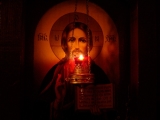 Глава УГКЦ у 158-й день війни: «Нехай Господь прийме з уст нашої Церкви псалми та моління за всіх тих, які особливо просять нашої молитви»
Глава УГКЦ у 158-й день війни: «Нехай Господь прийме з уст нашої Церкви псалми та моління за всіх тих, які особливо просять нашої молитви»
-
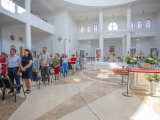 «Сила, яка походить із вірності Христові, є стержнем, який ніхто не може зламати», – Блаженніший Святослав
«Сила, яка походить із вірності Христові, є стержнем, який ніхто не може зламати», – Блаженніший Святослав
-
 Глава УГКЦ у 157-й день війни: «В ім’я Боже ми засуджуємо звірства в Оленівці і світ повинен це засудити як особливий вияв дикості й жорстокості»
Глава УГКЦ у 157-й день війни: «В ім’я Боже ми засуджуємо звірства в Оленівці і світ повинен це засудити як особливий вияв дикості й жорстокості»
-
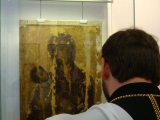 «Боже, почуй наш плач і поспіши нам на допомогу і порятунок!», – Глава УГКЦ у 156-й день війни
«Боже, почуй наш плач і поспіши нам на допомогу і порятунок!», – Глава УГКЦ у 156-й день війни
-
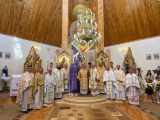 «Бог йому дав серце і душу українського народу»: відбулася щорічна проща до Прилбичів з нагоди уродин митрополита Андрея Шептицького
«Бог йому дав серце і душу українського народу»: відбулася щорічна проща до Прилбичів з нагоди уродин митрополита Андрея Шептицького
-
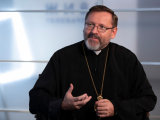 Глава УГКЦ: «Я горджуся українськими патріотами, які без найменшої краплі ненависті готові захищати своє»
Глава УГКЦ: «Я горджуся українськими патріотами, які без найменшої краплі ненависті готові захищати своє»
-
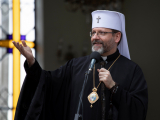 Блаженніший Святослав закликав українську молодь скласти присягу на вірність Христові
Блаженніший Святослав закликав українську молодь скласти присягу на вірність Христові
-
 Глава УГКЦ у 155-й день війни: «Помолімося, щоб не втратити скарбу віри князя Володимира»
Глава УГКЦ у 155-й день війни: «Помолімося, щоб не втратити скарбу віри князя Володимира»
-
 Блаженніший Святослав у День державності України: «Наша Держава – це для нас питання життя або смерті»
Блаженніший Святослав у День державності України: «Наша Держава – це для нас питання життя або смерті»
-
 Глава УГКЦ у 154-й день війни: «Нехай Господь Бог прийме у свої вічні обійми журналістів, які віддали за правду своє життя в Україні»
Глава УГКЦ у 154-й день війни: «Нехай Господь Бог прийме у свої вічні обійми журналістів, які віддали за правду своє життя в Україні»
-
 Глава УГКЦ у 153-й день війни: «Принесімо наш біль перед Боже обличчя і будьмо певні, що Він нас вислухає»
Глава УГКЦ у 153-й день війни: «Принесімо наш біль перед Боже обличчя і будьмо певні, що Він нас вислухає»
-
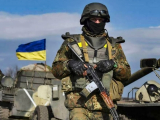 Глава УГКЦ у 152-й день війни: «Помолімся молитву заступництва за наших воїнів»
Глава УГКЦ у 152-й день війни: «Помолімся молитву заступництва за наших воїнів»
-
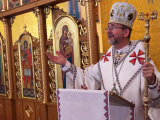 «Віруюча людина не може бути байдужою, коли бачить страждання іншої людини», – владика Богдан Дзюрах
«Віруюча людина не може бути байдужою, коли бачить страждання іншої людини», – владика Богдан Дзюрах
-
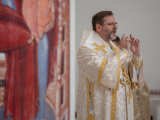 «Серед нашого страждання творімо простір для прояву Божої всемогутності», – Глава УГКЦ у 6-ту неділю після П’ятдесятниці
«Серед нашого страждання творімо простір для прояву Божої всемогутності», – Глава УГКЦ у 6-ту неділю після П’ятдесятниці
-
 Глава УГКЦ у 151-й день війни: «Російське віроломство ми перемагаємо силою любові до нашої Батьківщини»
Глава УГКЦ у 151-й день війни: «Російське віроломство ми перемагаємо силою любові до нашої Батьківщини»

